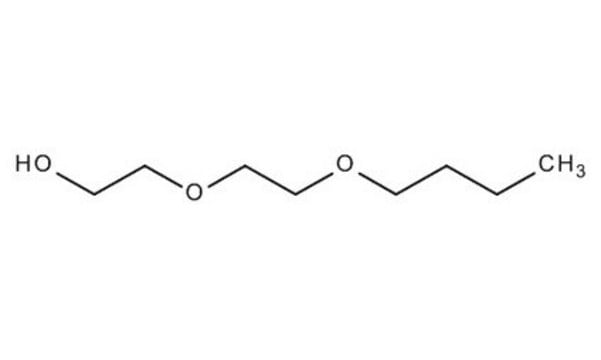579963
Diethylene glycol butyl ether
≥99%
Synonym(s):
Butyl CARBITOL™, 2-(2-Butoxyethoxy)ethanol, BDG, Butyldiglycol
About This Item
Recommended Products
vapor density
5.6 (vs air)
vapor pressure
30 mmHg ( 130 °C)
Assay
≥99%
form
liquid
autoignition temp.
400 °F
expl. lim.
6.2 %
refractive index
n20/D 1.432 (lit.)
pH
7
bp
231 °C (lit.)
mp
−68 °C (lit.)
density
0.967 g/mL at 25 °C (lit.)
application(s)
hematology
SMILES string
CCCCOCCOCCO
InChI
1S/C8H18O3/c1-2-3-5-10-7-8-11-6-4-9/h9H,2-8H2,1H3
InChI key
OAYXUHPQHDHDDZ-UHFFFAOYSA-N
Looking for similar products? Visit Product Comparison Guide
General description
Application
- Factors Affecting the Adsorption of Per- and Polyfluoroalkyl Substances (PFAS) by Colloidal Activated Carbon.: This study investigates the adsorption characteristics of PFAS by colloidal activated carbon, with a specific focus on the role of various solvents including diethylene glycol butyl ether. The research highlights the solvent′s effectiveness in enhancing adsorption efficiency (Hakimabadi et al., 2023).
- First Stage of the Development of an Eco-Friendly Detergent Formulation for Efficient Removal of Carbonized Soil.: This research explores the formulation of eco-friendly detergents, demonstrating the use of diethylene glycol butyl ether as a key solvent for effective soil removal. The study underscores its potential in creating sustainable cleaning products (Fernandes et al., 2022).
Legal Information
Signal Word
Warning
Hazard Statements
Precautionary Statements
Hazard Classifications
Eye Irrit. 2
Storage Class Code
10 - Combustible liquids
WGK
WGK 1
Flash Point(F)
210.2 °F - closed cup
Flash Point(C)
99 °C - closed cup
Personal Protective Equipment
Certificates of Analysis (COA)
Search for Certificates of Analysis (COA) by entering the products Lot/Batch Number. Lot and Batch Numbers can be found on a product’s label following the words ‘Lot’ or ‘Batch’.
Already Own This Product?
Find documentation for the products that you have recently purchased in the Document Library.
Customers Also Viewed
Our team of scientists has experience in all areas of research including Life Science, Material Science, Chemical Synthesis, Chromatography, Analytical and many others.
Contact Technical Service














